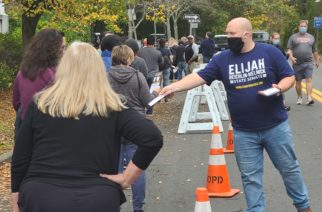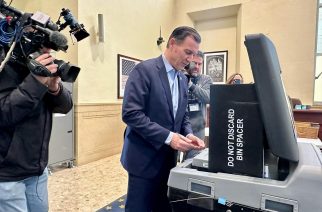
From left to right, Sen. Rob Rolison, Sen. Nathalia Fernandez, Assemblyman Jeffrey Dinowitz and Assemblyman Ed Ra spoke in favor of legislation that would offer all survivors of sexual assault equal protection under the law, regardless of intoxication status.
April is Sexual Assault Awareness and Prevention month and lawmakers are taking time to address some of New York’s questionable laws surrounding sex crimes with the help of organizations aimed at supporting survivors.
Under current New York law, a person who becomes voluntarily intoxicated and is then sexually assaulted does not hold the same legal protections as someone who was involuntarily intoxicated.
Sen. Nathalia Fernandez and Assemblyman Jeffrey Dinowitz, both Bronx Democrats, have sponsored legislation (S.4555B/A.1065) that would close this gap. The bill would make it so that a survivor’s intoxication status could not be used in the defense of a sex crime case.
“Existing law regarding the victims inability to consent has raised serious concerns over its implications for justice in sexual assault cases,” Senator Fernandez said at a press conference outside the Capitol on April 16. “The existing law says that a victim must be considered mentally incapacitated. In the legal sense, their impairment must result from being under the influence without their agreement. Meaning that if a victim voluntarily consumes, alcohol, or drugs and becomes impaired they are not considered legally incapacitated under the current rape statutes.”
This has created a so-called voluntary intoxication exclusion, as Sen. Fernandez put it, that leads to a discrepancy in the justice that can be served to survivors of sexual assault. Assemblyman Dinowitz said this stems from when the original legislation was passed 30 years ago where concerns of substances being slipped into drinks were high.
He and other supporters of the bill insist that regardless of intoxication status, all survivors deserve equal protections under the law.
“This is all about justice. Everybody deserves justice and anybody who is a survivor deserves justice. The idea that there is a difference between whether somebody is voluntarily intoxicated or not voluntarily intoxicated is absurd,” Dinowitz said. “If somebody has several drinks or take some drugs, it is not in and of itself an invitation to be raped. It’s not a get out of jail free card and we need to change the law to make sure that everyone is protected.”
The bipartisan legislation boasts co-sponsors from both sides of the aisle. The Senate and Assembly bills are sponsored by Democrats, Fernandez and Dinowitz respectively, but a number of Republicans are co-sponsors of the bills. Notably, Sen. Rob Rolison, R-Poughkeepsie, who spoke at the press conference, and Assemblyman Ed Ra, R-Franklin Square, are co-sponsors on the bills.
“[You’ll see] statistics that say about one in five don’t report being victims of sexual assault. There are a lot of individuals who are suffering by themselves and in silence who have been victimized,” said Senator Rolison. “These bills go a step forward to help those individuals heal and the ones that are going to be unfortunately victimized in the future to be able to have their justice. We heard a lot about statistics and they should awaken people to action, but behind every one of those statistics is a person and we owe it to them to fight here in Albany so they don’t stand alone.”

Executive Director of Community for a Cause, Chris Lake, discussed the statistics of other states that have adopted similar legislation as what is being proposed with these bills.
Executive Director of Community for a Cause, Chris Lake, spoke at the press conference about the current state of New York’s exclusionary laws surrounding rape.
“When the Department of Justice funded research on rape they found the righest risk is for those who are voluntarily intoxicated. Which means currently in this state, the most likely victim of sexual assault does not have a day in court,” Lake said.
He added that 24 other states have passed laws getting rid of this exclusion. States like Minnesota and Michigan reported a 6% drop in rape after dropping the exclusion. In California, he said they noticed a 15% decrease.
“There’s a trend when bills like this are passed, perpetrators lose their fig leaf, they lose a place to hide,” Lake said. “They recognize that it is no longer safe to be the nefarious [person] they are behind closed doors.”
S.4445B has advanced to a third reading in the Senate. The Assembly bill, A.1065, is still in the Codes Committee. If approved by both houses, the bill can be sent to Gov. Hochul for review.









